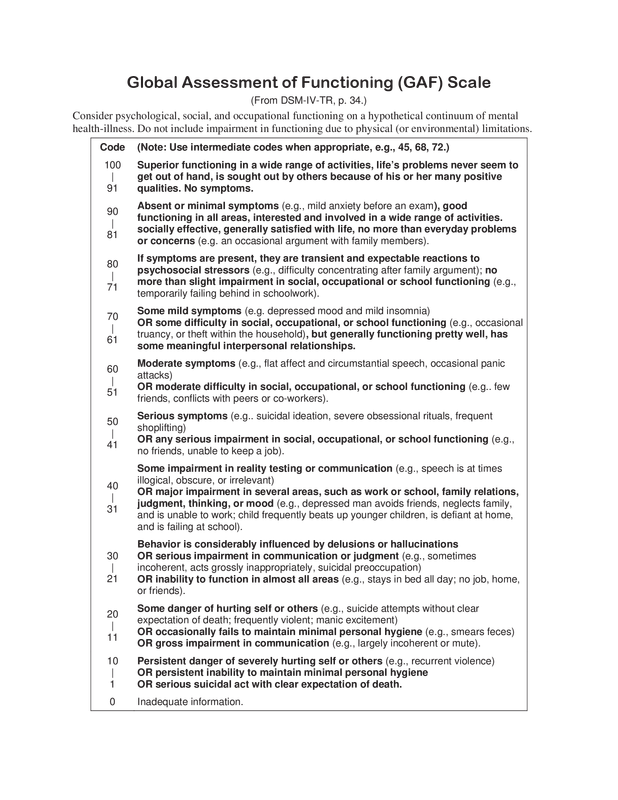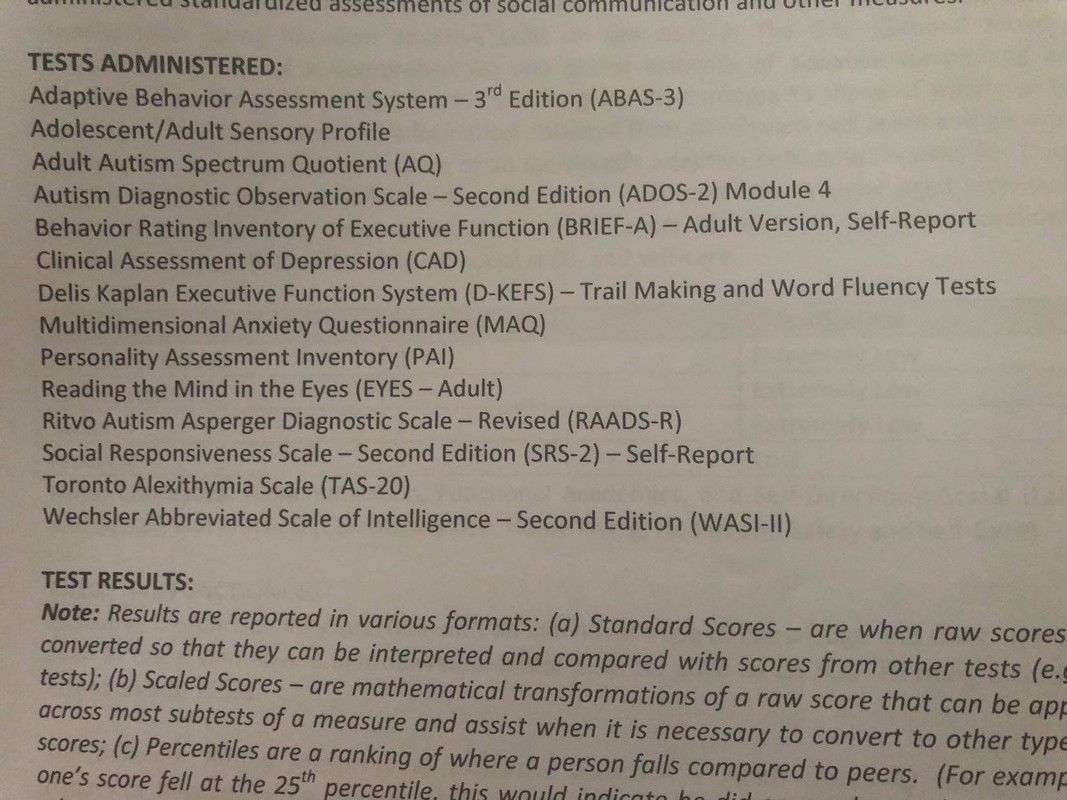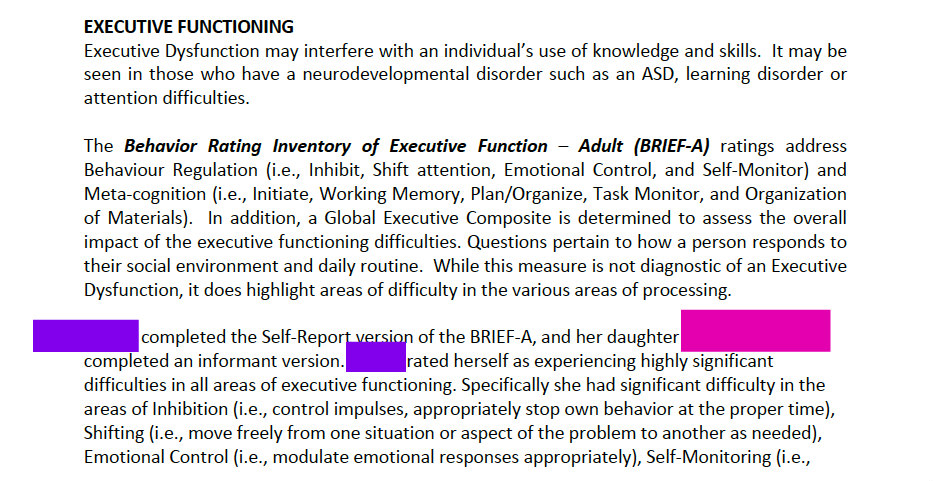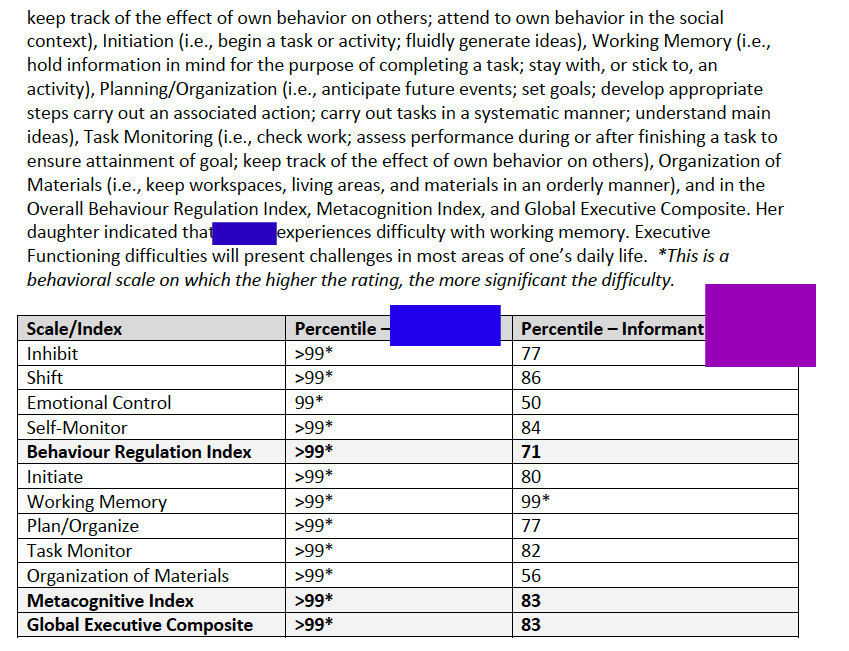Executive Funcion Anomaly -- ??
I was recently diagnosed ASD-1.
Is there a such thing as an autistic adult who actually has great executive functioning? I crushed this task at the assessment. My report said it's "very superior."
Yet I keep reading about one autist after another's poor executive functioning.
What's going on here? I know poor EF isn't required for a diagnosis, but it seems to go hand-in-hand with autism, like peanut butter goes with jelly.
I EXCEL at executive functioning. Does anyone else here?
Though, I'd assume that Elon Musk also excels at this, and he's autistic.
Good EF means mastering the organization of the tasks of daily living. It means you don't need help with money management, balancing a checkbook, ordering off Amazon, shopping, returning something for a refund (even though you may avoid eye contact or hate dealing with people, but you still get the task done), cooking, making doctor and other appointments, household duties, remembering to pay bills, keeping up with self-care, performing tasks on the job (though you may get fired for "not fitting in"), and just overall keeping your sh-t together. Great EF means you're so good at "higher brain functioning" that you can be a good caregiver to a sick or injured person. An autist who runs a business that employs NT people probably has great EF.
ASPartOfMe
Veteran

Joined: 25 Aug 2013
Age: 66
Gender: Male
Posts: 34,415
Location: Long Island, New York
Snapshot: What executive function is
Some people describe executive function as “the management system of the brain.” That’s because the skills involved let us set goals, plan, and get things done. When people struggle with executive function, it impacts them at home, in school, and in life.
There are three main areas of executive function. They are:
Working memory
Cognitive flexibility (also called flexible thinking)
Inhibitory control (which includes self-control)
Executive function is responsible for many skills, including:
Paying attention
Organizing, planning, and prioritizing
Starting tasks and staying focused on them to completion
Understanding different points of view
Regulating emotions
Self-monitoring (keeping track of what you’re doing)
Signs of executive functioning issues
Trouble with executive function can affect people in different ways. The difficulties often look like the signs of ADHD. That’s because ADHD is a problem with executive function.
People struggling with executive skills may:
Have trouble starting and/or completing tasks
Have difficulty prioritizing tasks
Forget what they just heard or read
Have trouble following directions or a sequence of steps
Panic when rules or routines change
Have trouble switching focus from one task to another
Get overly emotional and fixate on things
Have trouble organizing their thoughts
Have trouble keeping track of their belongings
Have trouble managing their time
Trouble with executive function isn’t a diagnosis or a learning disability. But it’s common in people who learn and think differently. Everyone with ADHD has trouble with it. And lots of people with learning challenges struggle with executive function, too.
These difficulties can cause trouble with learning. But they don’t mean that people are lazy or not intelligent. People who struggle with executive function are just as smart and work just as hard as other people.
There’s no diagnosis called executive function disorder. But there are specific tests that look at a wide range of executive skills. These skills include:
Attention
Inhibitory control
Working memory
Organization and planning
Concept formation
Set shifting (the ability to shift from one task to another)
Word and idea generation
Executive dysfunction is considered a common co-morbid of Autism but is not part of the diagnostic criteria so it's possible to have good executive functioning and autistic.
FYI I took the test referenced as part of my assessment. It said 90 percent of the population has better Executive Functioning then I.
_________________
Professionally Identified and joined WP August 26, 2013
DSM 5: Autism Spectrum Disorder, DSM IV: Aspergers Moderate Severity
It is Autism Acceptance Month
“My autism is not a superpower. It also isn’t some kind of god-forsaken, endless fountain of suffering inflicted on my family. It’s just part of who I am as a person”. - Sara Luterman
EF is normally evaluated using a rating scale called the Global Assessment of Functioning (GAF).
People on Disability benefits are likely familiar with this. 
In my ASD assessment I received a GAF score as well as sub-scores for different types of functioning (social, adaptive, personal care, leisure etc). The sub-scores were measured in percentiles. EF is also measured in ADHD and depression / anxiety / mental health testing. Many autistic people have ADHD or mental health challenges.
_________________
And in the end, the love you take is equal to the love you make.
ThisTimelessMoment
Deinonychus

Joined: 15 Apr 2021
Age: 50
Gender: Male
Posts: 324
Location: South Africa
ASPartOfMe
Veteran

Joined: 25 Aug 2013
Age: 66
Gender: Male
Posts: 34,415
Location: Long Island, New York
AsPartOfMe, where does that quote come from?
I don’t know.
_________________
Professionally Identified and joined WP August 26, 2013
DSM 5: Autism Spectrum Disorder, DSM IV: Aspergers Moderate Severity
It is Autism Acceptance Month
“My autism is not a superpower. It also isn’t some kind of god-forsaken, endless fountain of suffering inflicted on my family. It’s just part of who I am as a person”. - Sara Luterman
One way to think of EF is like a super Executive Secretary - like Pepper Potts. It is the part of your brain that organizes all the other parts. Having poor EF means you would be a poor Executive Secretary for someone else - or yourself. It is sometimes also likened to the conductor in an orchestra. Studies show that statistically AS A GROUP people diagnosed with ASD (Autism Spectrum Disorder) have specific challenges with EF more than the control group (without the diagnosis). Same for ADHD (Attention Deficit / Hyperactivity Disorder) but for different EF functions. Parkinson’s also has EF problems. ASD INDIVIDUALS have a lot of variation.
My wife’s mother was an Executive Secretary. My wife is super organized and was assistant to a Financial VP at a college before being promoted to Director of Institutional Research. I am much better at improvising than planning. EF challenges are par for the course for me.
The exact definition of EF changes a bit depending on who you ask.
_________________
ADHD-I(diagnosed) ASD-HF(diagnosed)
RDOS scores - Aspie score 131/200 - neurotypical score 69/200 - very likely Aspie
ASPartOfMe
Veteran

Joined: 25 Aug 2013
Age: 66
Gender: Male
Posts: 34,415
Location: Long Island, New York
People on Disability benefits are likely familiar with this.

In my ASD assessment I received a GAF score as well as sub-scores for different types of functioning (social, adaptive, personal care, leisure etc). The sub-scores were measured in percentiles. EF is also measured in ADHD and depression / anxiety / mental health testing. Many autistic people have ADHD or mental health challenges.
As part of my Autism assessment I took the ‘Behavior Rating Inventory of Executive Function - (BRIEF-A)’ test.
_________________
Professionally Identified and joined WP August 26, 2013
DSM 5: Autism Spectrum Disorder, DSM IV: Aspergers Moderate Severity
It is Autism Acceptance Month
“My autism is not a superpower. It also isn’t some kind of god-forsaken, endless fountain of suffering inflicted on my family. It’s just part of who I am as a person”. - Sara Luterman
It seems to me that executive function is a large, mixed bag of cognitive abilities, and that it's entirely possible for an Aspie to excel in some of those abilities. As often happens with psych definitions, I'm not particularly sold on the seemingly arbitrary definition of EF, and therefore find it hard to know what it's supposed to be or whether or not I'd be better off just thinking about different aspects of it separately without needing to see them as all part of the same concept. It doesn't seem self-evident to me that those aspects should be grouped together. Here's one web page that attempts to define EF:
https://www.psychologytoday.com/us/basi ... e-function
As for the supposed signs of poor EF they describe there, I don't have much trouble remembering information as long as it's about a project I'm immersed in, and like most normal people I write things down to avoid the risk of forgetting something important. I can plan and execute tasks quite well, though it depends what they are. If it's a largely practical task I usually do well, if there's a strong element of bureaucracy in it, then it's harder, because bureaucrats have a strange view of reality that doesn't correlate well with practical matters. I've been able to plan and carry out a journey from Arkansas to England alone, with minimal help - it was scary to anticipate all the possible pitfalls, and I was slow to get the plan together, but I managed to do it. I generally keep items and information quite well organised. I can usually maintain motivation but find it hard to make a start with some important tasks, though I rarely miss a deadline. I keep my emotions under enough control to function adequately. Impulsiveness isn't a big problem and I can usually keep my attention on a task as long as I have an active role in it beyond just taking in whatever an information source feels like saying to me for a long time.
Me, my husband and his brother all have autism/aspergers (it's just seen as high functioning autism in the UK now they did away with the phrase aspergers).
We own a very successful car dealership selling high end sports cars and pickup trucks between us. I used to have very bad EF but I somehow learned out of it by putting myself in high stress panic situations which sort of brute forced organisation and having my s**t together.
I was reading something a while ago about how they teach army guys to diffuse bombs, they make them believe it's real so they remember more and put them into a panic state, maybe being in a stressed state has something to do with rewiring your brain.
_________________
The term Aspergers is no longer officially used in the UK - it is now regarded as High Functioning Autism.
High Stress situations produce adrenaline - which is a close cousin to norepinephrine - which is the neurotransmitter my ADHD meds target.
Some people with ADHD overcompensate by using planners and calendars and so on - it is like they fear disaster if they don’t (or maybe remember disaster). I use a smart phone, a smart watch and own a laptop computer - have read lots of books on ADHD, business success and organization. I still mess up EF stuff. One joke at my house is my wife telling me “don’t forget xyz” two minutes before my electronic xyz alarm goes off. She just knows - I need tech
_________________
ADHD-I(diagnosed) ASD-HF(diagnosed)
RDOS scores - Aspie score 131/200 - neurotypical score 69/200 - very likely Aspie
A distressed state like that would give me an either/or situation due to an overload of adrenaline into my system. Either (If I had an outlet) I would be able to cycle my bicycle and start overtaking cars (Rarely can I put the adrenaline into good effect these days as I mostly today get the "OR" side of things... OR it would push me into a shutdown and usually a total shutdown. Thr former was why I used to do soo well at mountain bike racing as I had full on anxiety that I could channel th adrenaline into good effect! But that was not always the case, though I found when I was younger I did this more often...
But as I got older the more I found I would shut down. Shutdowns are horrible and annoying and make me totally washed out.
This link is very similar to what I get but I get slightly less issues with lights but at the same time I would not be able to walkas I would lose my strengt and would end up on the floor. Also my eyesight would dim and turn to black like a stage curtain coming in a line from the top down.
https://youtu.be/1CNY6BbtgS8
I don't know if I am on the spectrum but the shutdown experience is so identical to what I get that I copied the link and used to put it on my signature.
_________________
.
Dear_one
Veteran

Joined: 2 Feb 2008
Age: 75
Gender: Male
Posts: 5,717
Location: Where the Great Plains meet the Northern Pines
I did the BRIEF-A as well.
Here's a list of my tests:



It seems like you and I are similar in terms of having very low clinical EF scores.
My summary confirms your description of the skills measured in executive functioning.
These are my scores for adaptive behaviour, which I think are quite telling:

All of these were measured a second / third time when I went for ADHD testing, and when I first started working with my Occupational Therapist.
_________________
And in the end, the love you take is equal to the love you make.
I always find these sorts of assessments/questions absurd because of the inherent comparison involved between the person being assessed and others. There's no objective standard; it's always just whether you seem to do better or worse at these things than others around you. But what if everyone around you is bad at these things? Then you're normal! Take inhibition. If you have very quiet, naturally inhibited parents, they may see every tantrum as problem. Meanwhile, there are some neighborhoods where people have fights and the police show up every day. Who has the "inhibition" problem? The kid who threw some cheerios on the floor or the guy who beat up his girlfriend? Now who gets diagnosed with an "Executive Functioning Disorder"? The kid who doesn't live up to his mom's standards.
I'm not saying "there's nothing here". I'm saying the diagnostic standards and assessments strike me as an ad-hoc pile of woo.






